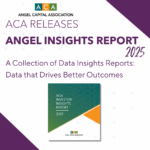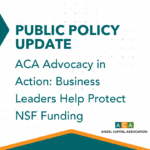Angel Insights Blog

Tuesday, March 31, 2020
Advice and Caution on Angels’ Role In This Crisis
Christopher Mirabile, ACA Chair Emeritus, Managing Director at Launchpad Venture Group and Co-Founder of Seraf-investor.com
We are all dealing with a lot right now – health, family, work, economic concerns. Angel community leaders have the additional challenges of adapting their processes to work over video, and assessing the damage spreading through the portfolio of startups in their flock. Given how much people are dealing with I thought it might be useful to give folks some important reminders.
With so many portfolio companies in distress, the topic of which companies will survive and which won’t naturally comes to the fore. As a detached investor it can sometimes feel like a business or strategic question. But this is a very delicate topic, and we all need to be very sensitive to the risks for an angel organization, as well as each of us individually as angels and directors when approaching it. Quite apart from any economic implications, these are not companies so much as small groups of human beings going through a life-defining crisis. Many of our startup management teams have never had to lay off people before, let alone hand-picked teams with whom they have developed close working relationship. Nor face a completely and suddenly uncertain future. Nor face inevitable feelings of total failure and helplessness. Anybody going through that, young or old, would need support. So first and foremost, we need to be at our most human, our most empathetic, no matter how disappointed we may be to see a company’s prospects, and our investments, melt away.
Further, we should be very cautious in our talk about declining valuations and “great opportunities.” While it is true that this heath and economic crisis may cause the fundraising market dynamics around us to change in the coming weeks and months, now is not the time to be thinking of ourselves, nor the time to be profiteering or taking advantage. In past downturns, VCs have been harshly criticized for tone-deafness. For a current stomach-turning example of what it looks like to “mis-read the room” consider this recent letter from a prominent VC which was leaked by one of his disgusted LPs. This may not be that VC’s first regatta, but it appears to be his first day as a human being with common sense. Let’s set a better example in our community.
Beyond the question of human decency, there are additional risks for us embedded in the question of portfolio company struggles and the related issue of “picking winners.” These are potentially serious risks for angel organizations and their members and board delegates, so I caution all my colleagues to be very mindful of the following two points:
(1) Do Not Give Investment Advice
Angel leaders are not investment advisors. They should avoid and discourage the concept of “triage.” We are here to help the companies we can to the best of our ability. There may not be enough time, help or money to go around, but our focus is most appropriately placed on helping those we can not killing those we cannot. Telling people whether or how to “triage” their portfolio is NOT our role – we are not registered investment advisors. We do not give investment advice. Every investor needs to make his or her own decisions on each company for his or her own reasons. Our role is to facilitate discussions, and share information, but we are NOT in the business of giving advice or making recommendations.
(2) Do Not Undermine Rounds or Write-Off Companies
In good times angels tend to make decisions through consensus. In down times, operating that way can be perilous. Holding and documenting a meeting at which it is decided to coordinate the withholding of support for a company creates a lot of risk for angel organizations. There have been cases of serious legal liability for organizations in such situations. The liability comes from other shareholders. If other shareholders, particularly inexperienced ones who did not understand the risks they were getting into or who believed their on-paper valuations were real, feel an angel organization, its management, or one of its board delegates was instrumental in causing a company to fail and cause a write-off, those shareholders may attempt to sue. The merits of such a case would be debatable, but the hassle and expense of defending one are not.
So please:
- Act like the compassionate human being you are (or as the bumper stick says, be the person your dog thinks you are)
- Generously and selflessly offer the advice and support you can
- Understand the extreme difficulty and stress our startups are going through
- Do not be a mercenary advantage-taker who brings shame on all angels
- Do not send any communications which suggest you have anything to do with driving or advocating “triage” types of decisions
- Stay healthy, keep your perspective, and remember that no matter how bad this gets, it too will pass.
Tags:






